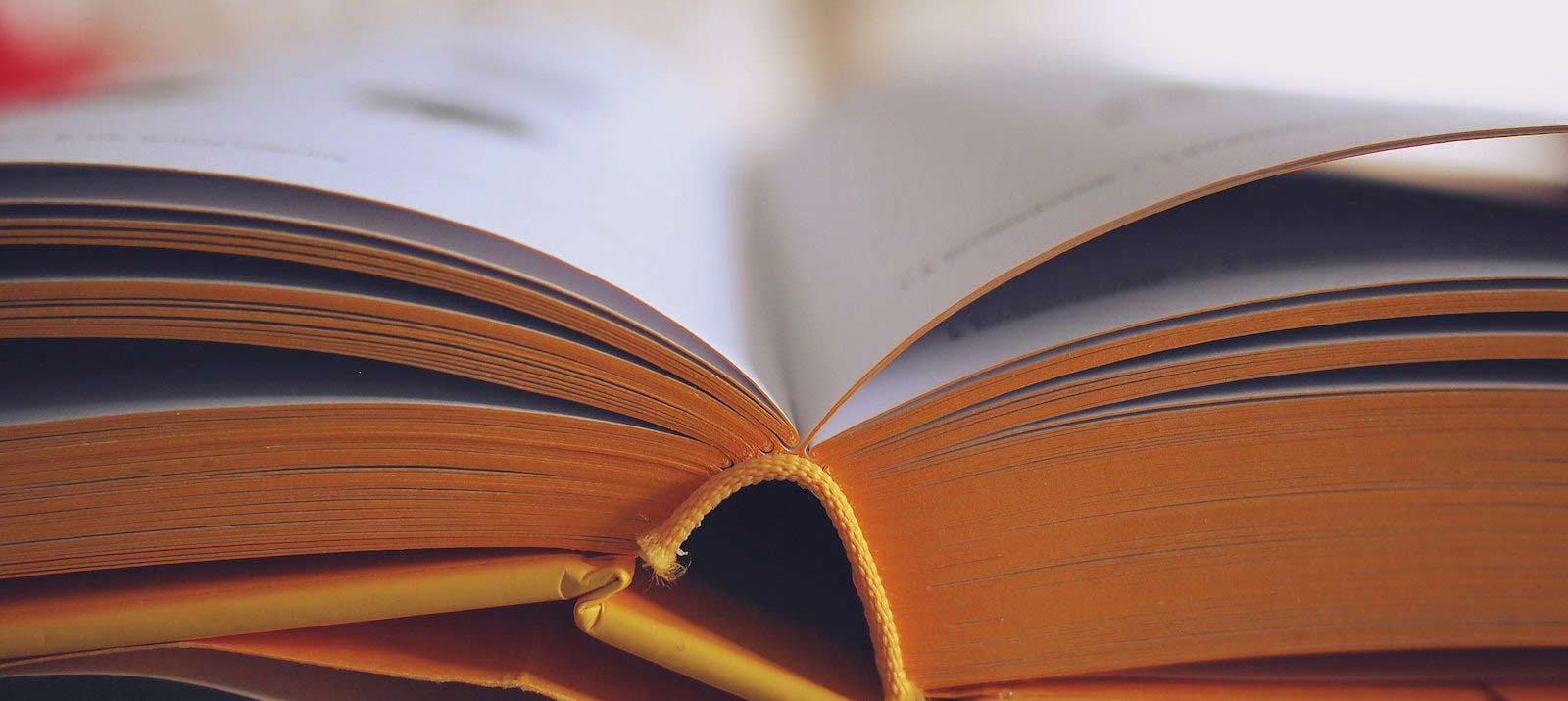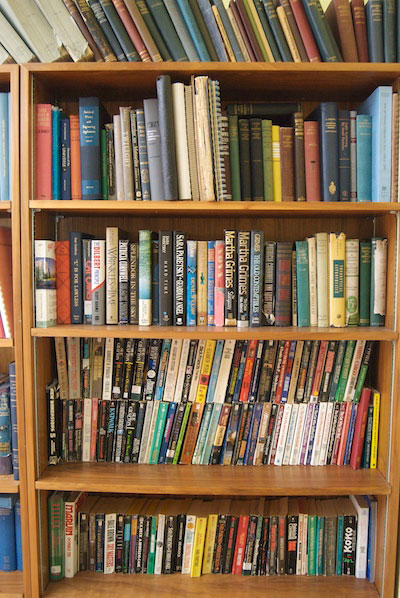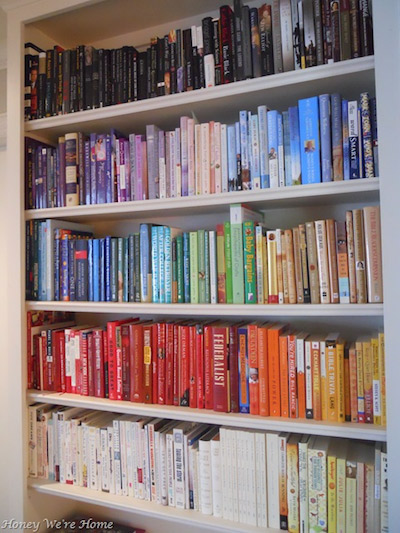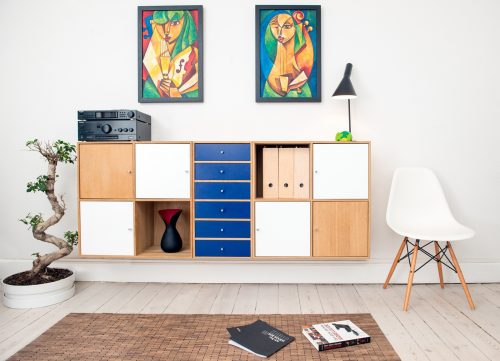If you’ve been in the habit of carelessly cramming your books wherever there’s an extra inch of shelf space, it’s time to step up your organization game.
A solid book organization system doesn’t just make it easier to find what you’re looking for — it also makes you more likely to actually pick up a book and read.
Organizing your favorite reads doesn’t need to be complicated or time-consuming, either. We’ve rounded up a list of 15 easy, smart ways to organize your books — no professional librarian experience is necessary.
Pro Tip: Before you organize your books, you may want to declutter. Here’s how to decide which books to keep or get rid of.
15 Ways to Organize Your Book Collection
1. Separate your hardcovers and paperbacks
Because who doesn’t want their bookshelves to look like a minimalist’s dream? Divide your hardbacks and paperbacks for that oh-so-clean and streamlined aesthetic. Place your hardcover novels on the top shelf, because, of course, they deserve to be on display, and banish those flimsy paperbacks to the bottom. Perfect for the visual perfectionist who absolutely must locate that thick hardcover biography or slim paperback mystery in record time.
2. Arrange your books by color
This organization strategy is ideal if you’re the type of reader who tends to associate certain stories with their covers, or if you’re just really into the idea of statement bookshelves.
The best part about this method is that you can get super creative — stack your colors, try an ombré pattern, or opt for a rainbow look.
Pro Tip: If you like color-coordinating your books, try doing it to your wardrobe, too.
3. Don’t be afraid to stack books
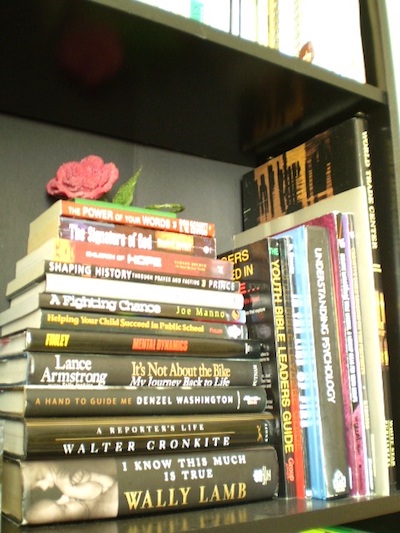
Keeping all your books in neat rows is a thing of the past. If you want a handful of select books to stand out, stack ‘em. You can stack by theme, cover, or size, and keep stacks on their own or use them to break up a row. There’s no wrong way to do it.
Book storage with Clutter now!
4. Organize books by genre or subject
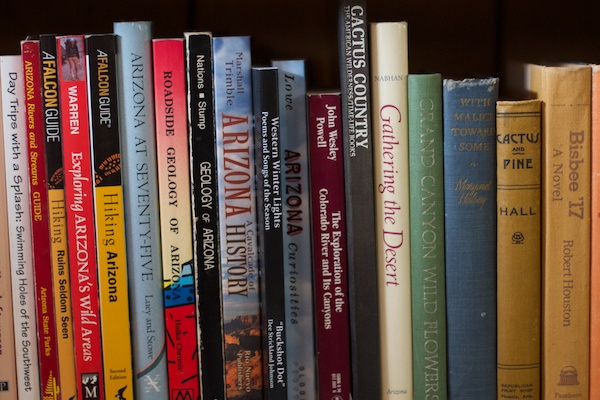
Group your mysteries together, your travel memoirs, your 18th-century English literature novels, your cookbooks, and so on.
Organizing by genre and subject makes it a cinch to find the right book for your current mood and interests, so you’ll know exactly where to look when you need to satisfy your World War II curiosity or want a little romance story to spice up your Saturday night.
5. Display your favorite books front and center
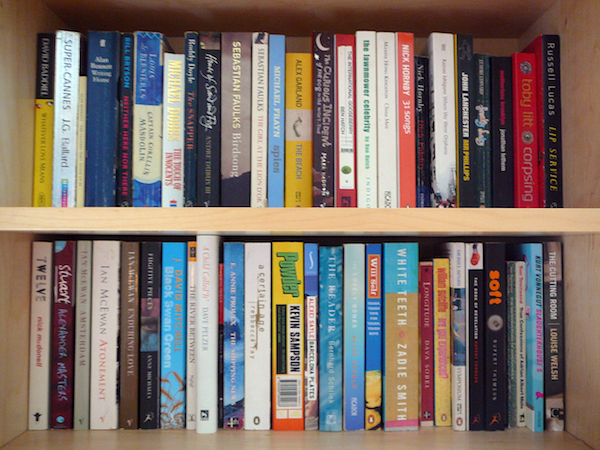
Instead of lumping your favorite books in with all their mediocre peers (then frantically scanning the shelves every time you want to reread them), display them front and center where they can shine.
Free Bonus: Having trouble fitting your books on your shelves? Check out these 9 creative book storage hacks for small apartments
6. Organize your books alphabetically
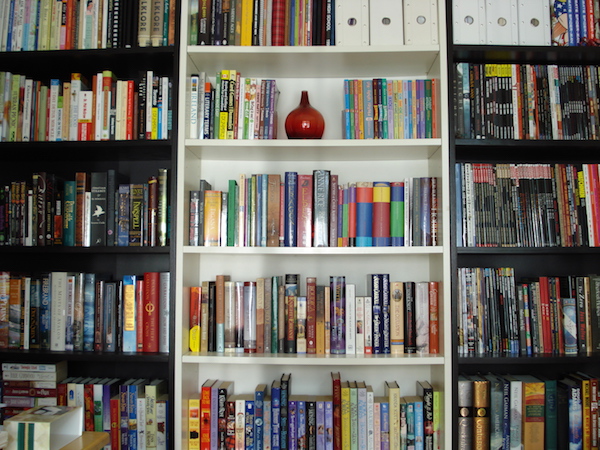
Alphabetical organization works best if you remember book titles and author names more than genres and plot points. It’s also ideal if your collection of books is so massive it’s basically a mini library.
Even better than the sense of accomplishment you’ll get from organizing your books alphabetically?
The satisfaction you’ll feel when your friends stop by to borrow a book and know exactly where to find it.
7. Organize your books according to how they made you feel

Maybe some books made you weep with sadness, while others had you laughing aloud to yourself at two in the morning. Maybe you read books so gripping you didn’t leave your couch for hours at a time. Maybe some books inspired you to pursue your passions, while others shattered your innocence. Maybe you read books that changed your life and others that made no impression at all.
If you tend to have strong emotional responses to books, this organization method is an awesome way to categorize and distinguish what you’ve read.
8. Group together the books you haven’t read yet
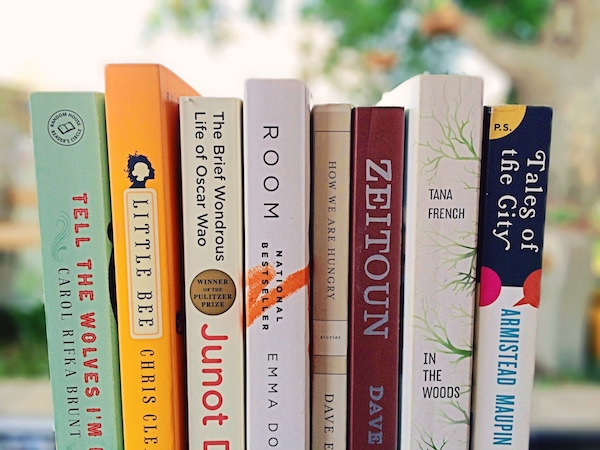
Gather all the books you haven’t read yet and place them in their own special TBR (To Be Read) section so they don’t get lost among the other titles.
The best part?
You always have a book or two (or maybe five) to reach for when you need a fresh new read.
9. Arrange your books by height and size
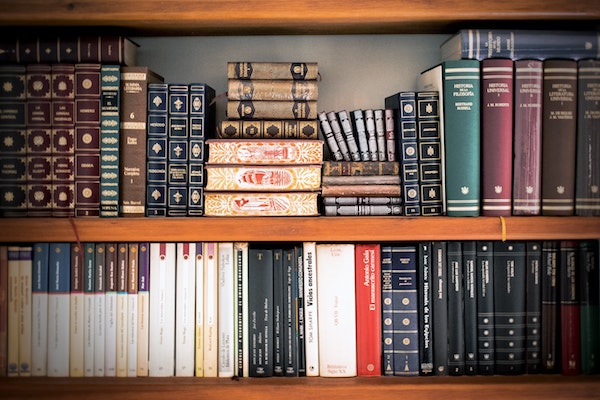
Keep books of similar size and height together to give your collection a clean, uncluttered feel. The goal here is to create straight, even lines with the tops of your books — no staggered mountaintop rows allowed.
10. Separate your books by author: contemporary or classic
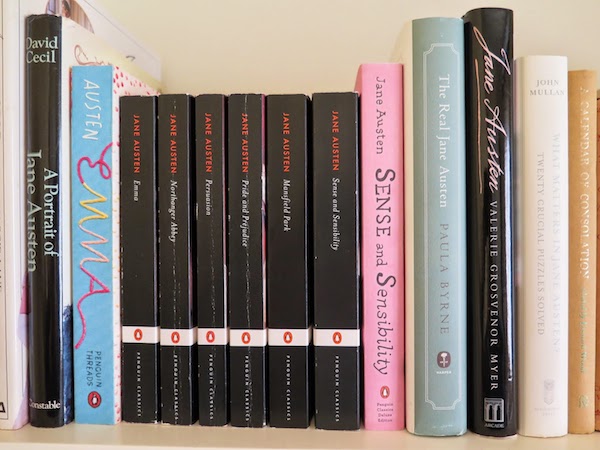
This method works best if you have a diverse collection of old and new books. We’re talking Stephen King and Toni Morrison types, plus your Fitzgeralds, Austens, and Hemingways.
You can define contemporary and classic however it suits you: living and deceased authors, books written before and after a certain date, or books published in specific time periods.
11. Organize books by the condition of their covers
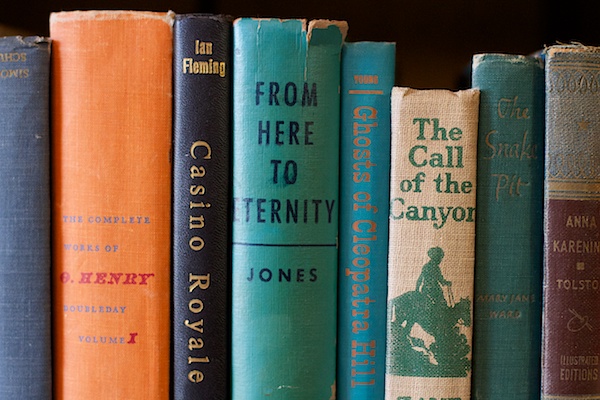
This is another way to limit visual clutter on your bookshelves. Keep your torn, tattered, and weather-faded books all in one place, and your books with beautiful, well-kept covers in another.
12. Separate fiction and nonfiction
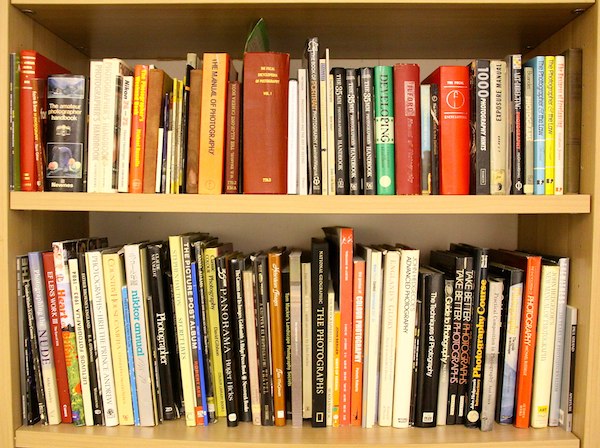
Every bookstore around the world employs this method because it’s simple and classic. Just group fiction books together and store everything else in another spot. Easy.
For all the books you can’t fit on your shelves but don’t want to say goodbye to, use Clutter.
Simply schedule a pickup and pack your stuff. We’ll grab everything from your home and transport it to our secure, temperature-controlled storage facility.
And when you need that box of 1980s crime novels back, just browse the convenient online photo catalog of your stuff, click the item’s photo, and we’ll deliver it straight to you.
13. Organize by Reading Status
Because who doesn’t love keeping track of yet another to-do list? Create sections for books you’ve read, are currently reading, and the ever-growing to-be-read pile. This way, you can proudly display just how many books you’re pretending you’ll get to next.
14. Organize by Mood or Genre
Arrange your books by mood or genre, because we all know that finding the perfect book to match your current vibe is just as crucial as matching your socks. Got thrillers for those nights you want to sleep with the lights on, romance novels for those “why am I still single?” days, and motivational reads for when you’re feeling particularly delusional about self-improvement.
15. Organize by Favorite Authors
Dedicate sections of your bookshelf to your favorite authors. This way, you can easily locate that beloved series when you need a quick literary escape or want to show off your impeccable taste to house guests. Plus, it’s a great way to see just how much you’ve contributed to their retirement fund.
5 Essential Tips for Maintaining Your Books
1. Store Properly
Because obviously, stacking your precious novels in a damp, sunlit corner is a brilliant idea. Instead, keep them upright on a shelf in a cool, dry place away from direct sunlight to prevent them from turning into faded relics. Use bookends, unless you want your books doing the limbo.
2. Handle with Clean Hands
As tempting as it is to flip through your favorite book with greasy fingers after munching on a bag of chips, resist the urge. Wash and dry your hands, because those mystery stains and fingerprints don’t make for good page decor.
3. Use Bookmarks
We all love that satisfying crunch of folded page corners, right? Wrong. Save the spine and pages by using a bookmark. Heavy objects for keeping your place? Brilliant—if you’re looking to turn your book into an accordion.
4. Avoid Eating or Drinking Near Books
Who doesn’t enjoy a good wine spill or coffee stain on their novel? Keep food and drinks far away from your books, unless you’re aiming for that authentic, “aged by spills” look.
5. Dust Regularly
Books love wearing dustcoats, don’t they? Dust your books and shelves periodically with a soft, dry cloth. Unless, of course, you’re running an experiment on how quickly dust can turn a book into a relic.
5 Benefits of a Well-Organized Book Collection
1. Avoiding the “Lost Book” Panic
Ever spent hours searching for that one book you swore was on the second shelf, only to find it months later behind the couch? With an organized collection, you can avoid these mini heart attacks and find your favorite novel right where you left it.
2. Impressing Your Friends
When friends come over and marvel at your neatly arranged bookshelves, you get to enjoy the ego boost of being “that organized person.” Plus, it’s a great way to subtly show off how well-read you are, even if you haven’t actually read half of those books.
3. Easier Dusting
No more pretending you don’t see the dust bunnies forming around those haphazard stacks. With everything in its place, dusting becomes a breeze, and you can finally avoid that allergy attack waiting to happen.
4. Quick Access to Reference Material
When you’re in a heated debate about who the best author of the 21st century is, you can quickly pull out the relevant literature to prove your point. No more fumbling around and losing credibility because you can’t find your go-to book.
5. Creating the Illusion of Productivity
A well-organized bookshelf makes you look like you’ve got your life together, even if you spent the whole weekend binge-watching shows. It’s the perfect backdrop for your Zoom calls, giving off the impression that you’re incredibly diligent and scholarly.
Book storage with Clutter now!
FAQs: Organizing Your Book Collection
Find answers to common questions about keeping your book collection neat and accessible. Learn effective strategies for ordering, maintaining, and enhancing your bookshelf to make the most of your reading experience.
1. How should I order my books?
Arrange your books by genre, author, or title. Choose a system that suits your preferences, whether it’s alphabetical order, size, or even color.
2. What’s the best way to organize a large book collection?
Divide your books into categories, then organize each category by a method that works best for you, such as alphabetically or by publication date. Consider using labels or dividers for clarity.
3. Why should I organize my book collection?
An organized book collection makes finding books easier, keeps your space neat, and enhances your overall reading experience. It also helps protect your books and makes your collection look more appealing.
4. How can I keep my books organized in the long run?
Regularly review and sort through your collection. Return books to their designated spots after use and maintain a system for new additions to keep everything orderly.
5. How can I arrange my children’s books to encourage their reading habits?
Place books where they are easily accessible to children. Organize by theme or interest and regularly rotate the selection to keep it engaging. Create a dedicated reading area to make reading more inviting.


